Forces in Space
In practical applications, forces are usually involved in three dimensional space. Forces in a plane is only a special three dimensional case with the third direction equals to zero.
Force Decomposition
A force can be represented by a force vector, F, in three dimensional space. The force can be regarded as a plane force by assuming a plane passing through the force vector and normal to coordinate plane zx. And therefore force, F can be decomposed into a force, Fy along y axis and a force, Fzx in plane zx. Similarly, force, Fzx in plane zx can further be decomposed into a force, Fx along x axis and a force, Fz along z axis.
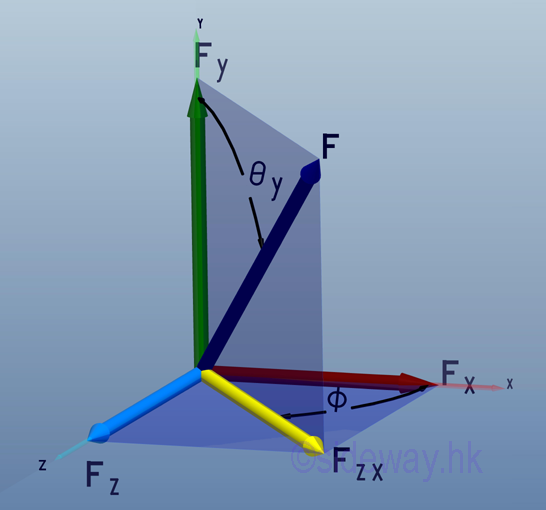
Therefore force vector, F, in three dimensional space can be decomposed into Fx, Fy, and Fz. Applying the laws of trigonometric, the magnitude of the three rectangular force vector components are:




And the magnitude of force vector, F, can be obtained by applying the Pythagorean theorem, imply:




The resultant force vector, F, can be obtained by vector addition of the three rectangular force vector components by applying Parallelogram Law, imply:

Assuming three unit vectors, i, j, and k, with unit magnitude along the x, y, and z axis. then

Imply
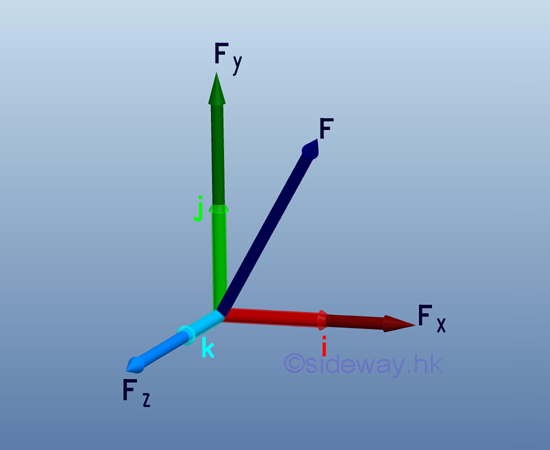
The three rectangular force vector components of the resultant force vector, F, can be arranged in a box, imply:
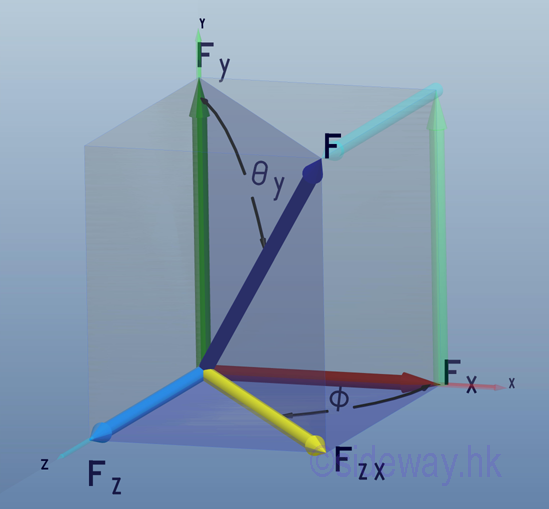
Direction Cosines
The direction of the force vector, F can be defined by the angles formed by the force vector and the three coordinate axes, θx, θy, and θz. Imply
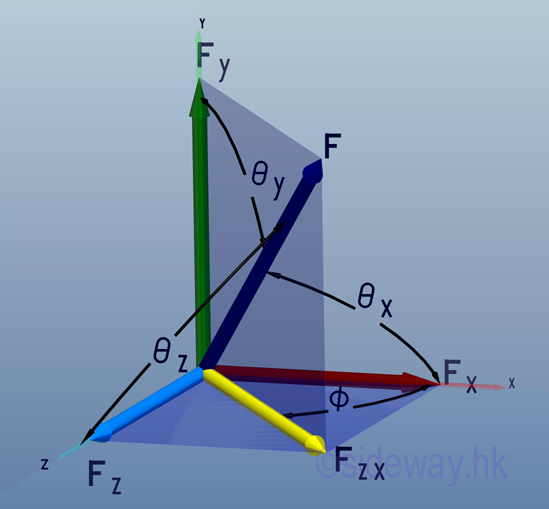
The magnitude of the three rectangular force vector components can be defined as:



The cosine of θx, θy, and θz are known as the direction cosines of the force vector, F. And the force vector becomes two dimensional force when one of the direction cosines equal to zero, that is angle equals 90 degree.
The magnitude of force vector, F can therefore be expressed in terms of direction cosines as following:

Imply the sum of the squares of direction consines equals to 1, that is:

And the values of direction consines or the angles are not independent.
The force vector, F can also be expressed in terms of unit coordinate vectors and direction cosines as following:

The format of the force vector expression can be treated as the product of the force magnitude and the unit direction vector. Let λ be the unit direction vector. Then


Similarly, the unit direction vector can also decomposed to three rectangular vectors:




The magnitude of the unit direction vector equals to one because:
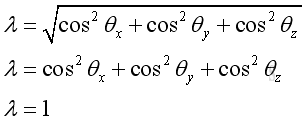
The relationship of force vectors and unit vectors is:
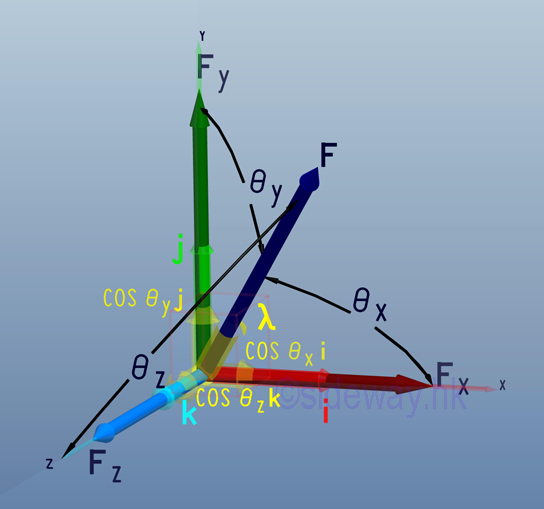
Laws of Trigonometric Relations
The direction of a force in space along the line of action can also be respresented by a relative position vector, d.
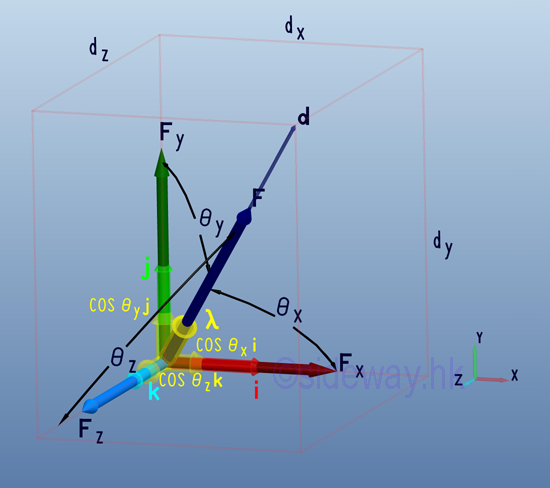
Similar to the force vector, F, the relative position vector, d can be expressed as:





Applying the laws of trigonometric relations, imply:

And:




©sideway
ID: 110400005 Last Updated: 6/23/2013 Revision: 1 Ref:
References
- I.C. Jong; B.G. rogers, 1991, Engineering Mechanics: Statics and Dynamics
- F.P. Beer; E.R. Johnston,Jr.; E.R. Eisenberg, 2004, Vector Mechanics for Engineers: Statics
Latest Updated Links
- Travel Singapore Sight Space(last updated On 12/30/2025)
- Travel Singapore Sight Curiosity Cove(last updated On 12/30/2025)
- Travel Singapore Sight Night Safari(last updated On 12/30/2025)
- Travel Singapore Sight River Wonders(last updated On 12/30/2025)
- Travel Singapore Sight Rainforest Wild ASIA(last updated On 12/30/2025)
- Travel Singapore Sight Singapore Zoo(last updated On 12/30/2025)
- Travel Singapore Sight Mandai(last updated On 12/30/2025)
- Travel Singapore Sight Bird Paradise(last updated On 12/30/2025)
- Travel Singapore Sight AltitudeX(last updated On 12/30/2025)
- Travel Singapore Sight(last updated On 12/6/2025)
- Travel Singapore Rail Network(last updated On 12/5/2025)

 Nu Html Checker
Nu Html Checker  53
53  na
na  na
na
Home 5
Business
Management
HBR 3
Information
Recreation
Hobbies 9
Culture
Chinese 1097
English 339
Travel 31
Reference 79
Hardware 54
Computer
Hardware 259
Software
Application 213
Digitization 37
Latex 52
Manim 205
KB 1
Numeric 19
Programming
Web 289
Unicode 504
HTML 66
CSS 65
SVG 46
ASP.NET 270
OS 431
DeskTop 7
Python 72
Knowledge
Mathematics
Formulas 8
Set 1
Logic 1
Algebra 84
Number Theory 206
Trigonometry 31
Geometry 34
Calculus 67
Engineering
Tables 8
Mechanical
Rigid Bodies
Statics 92
Dynamics 37
Fluid 5
Control
Acoustics 19
Natural Sciences
Matter 1
Electric 27
Biology 1
